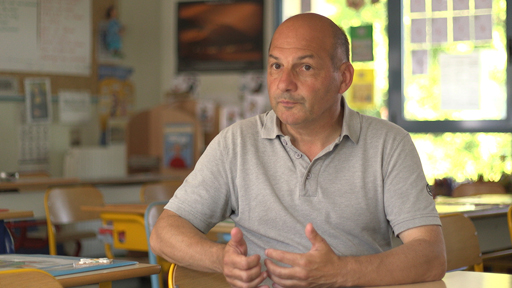7.1 Yann and working out the meaning of words
As you listen to Yann and complete the activities, you will learn how to identify ‘cognates’, words which share a similar origin, and this can help you to build up your vocabulary and ability to use words from the same family.
Activity 35

Transcript
Sometimes you can use your existing knowledge of French language and culture to work out the meaning of words which may initially seem unfamiliar. For example, you might know that ‘un enseignant’ is a teacher, ‘le périphérique’ is the ring-road around central Paris, ‘un cheval’ is a horse and ‘un baladeur’ is a personal stereo. Listen to Yann for the first 40 seconds of the clip (up to ‘balade’). How might the foregoing information help you to translate the underlined words and understand the phrases they are part of?
- j’ai fait le choix d’habiter aussi dans le village où j’enseigne
- un village qui est en périphérie de la ville d’Amboise
- la campagne […] me permet de {…] faire de la balade
Answer
- You might have realised that ‘enseigner’ is a verb because it is preceded by ‘je’; so if ‘un enseignant’ is a teacher, then ‘enseigner’ means ‘to teach’ and ‘où j’enseigne’ means ‘where I teach’.
- If the ‘périphérique’ circles the centre of Paris, then the village is ‘on the outskirts’ of Amboise.
- The similarity between the words ‘cheval’ and ‘cavalier’, the former an animal, the latter a person, suggests that ‘un cavalier’ is a horse rider.
- If a ‘baladeur’ is a personal stereo that can be listened to on the move, then ‘faire de la balade’ is likely to mean moving around, in the context of the preceding phrase to go for a ride on horseback.
Activity 36

Transcript
If you speak English or any of the European languages which emerged from Latin (Italian, Portuguese, Romanian, Spanish), then you can use your knowledge of these languages to understand many French words which share the same origin, similar spelling and usually the same meaning. These words are known as cognates.
Many French words ending in ‘-tion’ have cognates ending in ‘-tion’ in English, ‘-zione’ in Italian, ‘-ção’ in Portuguese, ‘-ţiune’ in Romanian, ‘-ción, in Spanish
Many French words ending in ‘-sion’ have cognates ending in ‘-sion’ in English, ‘-sione’ in Italian, ‘-são’ in Portuguese, ‘-iune’ in Romanian, ‘-sión, in Spanish
Many French words ending in ‘-té’ have cognates ending in ‘-ty’ in English, ‘-tà’ in Italian’, ‘-dade’ in Portuguese, ‘-tate’ in Romanian, ‘-tad’ in Spanish.
Many French words starting with the letter ‘é’ followed by a consonant have cognates in English, Italian, Portuguese, Romanian and Spanish where ‘é’ is either replaced by ‘s’ or ‘s’ is placed after the letter ‘e’ and before the consonant.
| French | English | Italian | Portuguese | Romanian | Spanish |
| nation | nation | nazione | nação | naţiune | nación |
| vision | vision | visione | visão | viziune | visión |
| liberté | liberty | libertà | liberdade | libertate | libertad |
| étudiant | student | studente | estudante | student | estudiante |
Now listen again to Yann, first without the subtitles, then if necessary with the subtitles. Using what you have learned above, can you hear the French words for
school (English)
attività (Italian)
curiosidade (Portuguese)
informaţie (Romanian)
profesión (Spanish)
Answer
école ; activité ; curiosité ; information(s) ; profession
Activity 37
One way in which you can use your existing knowledge of French to extend your vocabulary and thereby improve your listening comprehension skills is to try to learn related words (for example a noun, a verb and an adjective) together. In addition to making vocabulary learning more productive (three words for the price of one!) this will help develop your ability to work out the meaning of what may at first appear to be unfamiliar words. An example from Yann’s speech might be:
- enseignant (noun) = teacher; l’enseignement (noun) = education
- enseigner (verb) = to teach
- enseigné (adjective) = taught
Using a dictionary and the transcript, can you find other possible word groups for vocabulary learning based on words in the video clip ?
Answer
Here are some possible word groups that you might have thought of:
le directeur/la directrice (noun) = director; la direction (noun) = management; diriger (verb) = direct; dirigé (adjective) = directed
le choix (noun) = choice; choisir (verb) = to choose; choisi (adjective) = chosen
la permission (noun) = permission; permettre (verb) = to permit, allow; permis (adjective) = permitted, allowed
la plaisanterie (noun) = joke; plaisanter (verb) = to joke; plaisant (adjective) = funny
l’intérêt (noun) = interest; s’intéresser à (verb) to be interested in; intéressé (adjective) = interested in, concerned by
le contentement (noun) = satisfaction; se contenter de (verb) = to be satisified with; content (adjective) = satisfied
Discussion
When we listen to speech or read a text in a foreign language, we have several means of recognising individual words.
Words that have a common origin are called cognates; these often resemble in appearance their equivalent word in a related language, although their pronunciation may be quite different. However, a small number of words that look similar are false cognates or faux amis and have different meanings, for example the French word ‘éventuellement’ means ‘possibly’ in English and not ‘eventually’, ‘la chair’ means ‘flesh’ rather than a piece of furniture. Recognising cognates in speech may be more challenging than when reading: not only may the relationship between spelling and pronunciation vary greatly between different languages but it will also be necessary to break up the succession of sounds into individual words. You worked on some of the skills necessary to do this in the video clips featuring Manon and Franz.
Recognising words is only one of the processes involved in comprehension. Meaning can sometimes be deduced by understanding how linking words such as ‘and’, ‘but’, ‘so’, etc., relate words to each other to establish the overall meaning of a phrase or passage. Cultural knowledge can also play a part in helping us to infer the meaning of words or expressions in different contexts.
